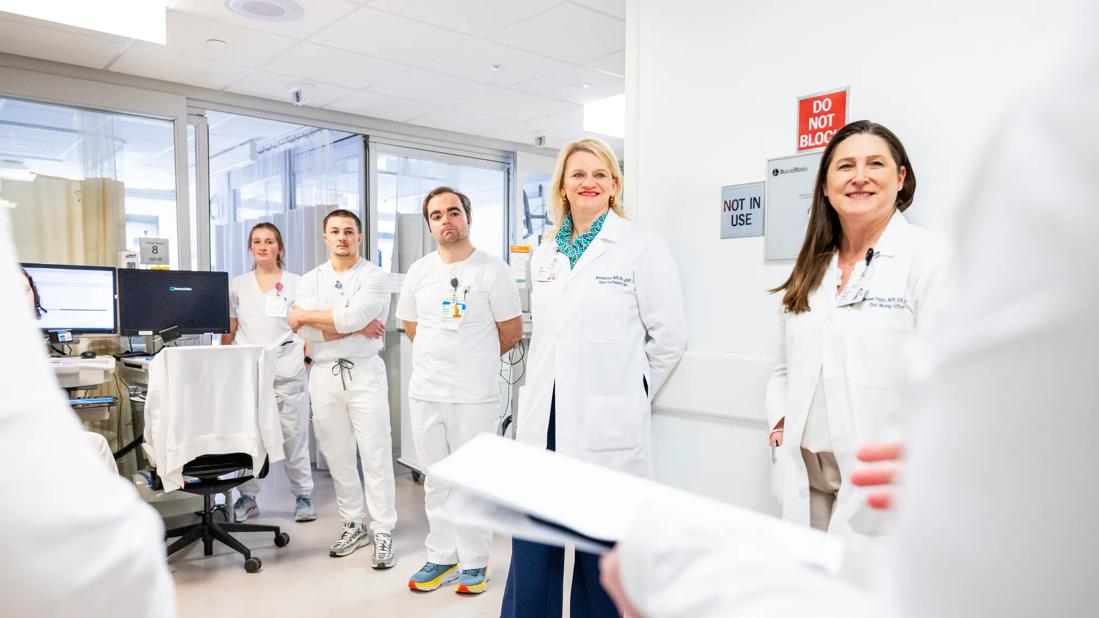Program thanks those whose actions personify Cleveland Clinic values

Image content: This image is available to view online.
View image online (https://assets.clevelandclinic.org/transform/9bdf5b27-bb76-4495-b11e-7dc4d23121ef/NUR_5737308_03-11-25_019_LDJ)
Nursing huddle
While driving on the highway last summer, Jeff Sommers noticed several people on the shoulder signaling for help. Sommers, advanced practice provider manager in the Emergency Department at Cleveland Clinic Mercy Hospital, pulled over, assessed the situation and administered CPR to a man with no pulse until paramedics arrived.
Advertisement
Cleveland Clinic is a non-profit academic medical center. Advertising on our site helps support our mission. We do not endorse non-Cleveland Clinic products or services. Policy
Not long after, Sommers was personally congratulated by Jorge Guzman, MD, MBA, Executive Vice President and President, Northeast Ohio Market, who thanked him for putting into practice one of Cleveland Clinic’s care priorities: caring for the communities it serves.
Dr. Guzman acknowledged Sommers as part of the health system’s Hero Huddles program.
“The program is a way to recognize our caregivers for going above and beyond – for doing something outside the scope of their job to help people in need, keep patients safe or provide a great experience,” says Alicia Pitre, Director of Volunteer Services in the Office of Patient Experience at Cleveland Clinic.
The Office of Patient Experience launched Hero Huddles during the COVID-19 pandemic to thank caregivers who were providing exceptional care during the challenging time in healthcare. The program was so well-received by leaders and caregivers alike that the office opted to continue it after the pandemic.
“It provides leaders a really strong reconnection with what we are here to accomplish as an organization, and we want to reach out directly to caregivers and tell them how much we appreciate them,” says Steven Shook, MD, Chief Safety, Quality and Patient Experience Officer at Cleveland Clinic.
Caregiver recognition in the program is facilitated through tiered huddles, which Cleveland Clinic instituted in 2018 to elevate operational information across the health system. The huddles include six levels, from Tier 1 (unit level caregivers and their managers/supervisors) to Tier 6 (enterprise executive chief officers).
Advertisement
“We use the tiered huddles to raise up – from our frontline to our executive leaders – these wonderful stories of caregiver excellence,” says Stephanie Bayer, JD, Senior Director in the Office of Patient Experience.
If a story is so notable that it makes it up to Tier 6, then the caregiver – the hero – receives a call or email from an executive leader. Pitre, who oversees the initiative, gathers details from the manager of the tier where the caregiver account originated, then assigns calls in rotation to one of more than two dozen executive leaders, including Tom Mihaljevic, MD, Chief Executive Officer and President of Cleveland Clinic.
“Some of these stories are so inspirational that our leaders say, ‘I’ve just got to talk to that person and thank them for truly being the best we can expect of ourselves as Cleveland Clinic caregivers,’” says Dr. Shook.
He recalls a particularly moving conversation he had with two security officers at Cleveland Clinic Akron General Bath Emergency Department, who safely retrieved a weapon from a man who arrived at the ED saying he wanted to harm himself.
“The officers put themselves in harm’s way, relied on their training to de-escalate situations like this and protected the patient’s dignity and safety, as well as the safety of everyone else in the emergency department,” says Dr. Shook. “The officers represent the best of us.”
Approximately two to four caregivers are recognized monthly through Hero Huddles each month, though there is no limit. Pitre and others in the Office of Patient Experience hope to spread the message about the program – and increase the number of caregivers who are acknowledged. Any employee is eligible, from those who provide direct patient care to environmental services staff, health unit coordinators, members of the transport team and others.
Advertisement
“We have a lot of ways to show gratitude at Cleveland Clinic,” says Dr. Shook. “This is certainly not the only one, but it’s one I think is special.”
He encourages others to adopt similar programs, citing the added advantages to healthcare organizations.
“It’s not only the right thing to do; it’s a strategic tool,” says Dr. Shook. “You build trust, you strengthen employee engagement, and you reinforce the behaviors and values that high-reliability organizations strive for.”
Members of the Office of Patient Experience offer a couple tips for health systems considering Hero Huddles. First, ensure you have buy-in from executive leaders who understand the value of showing gratitude. Second, don’t overengineer the program, says Bayer.
“Just do it with an authentic voice,” she says. “We have certainly evolved the assignment process and formalized rotations. But at the end of the day, it doesn’t have to be complicated. It’s just an opportunity to say thank you.”
Advertisement
Advertisement
Interdisciplinary program fosters high-performance teams
1:1 guidance benefits individuals and organization
Strategies for building connections, staying present
Development leader harnesses shared purpose to fuel meaningful giving
Expert tips from Cleveland Clinic’s Chief Legal Officer
Dedicated leader shares her passion for quality, education and professional development
Groups move the metrics in environmental services and sterile processing
Certified coaches help hospital teams build trust, improve communication